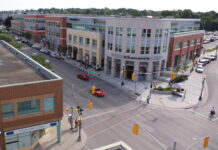The University of Waterloo is comprised of six faculties, each with countless specializations and areas of expertise. As social issues evolve and students of these faculties are faced with addressing complex challenges, the intersection of knowledge and community building becomes evident.
“We started this because what we really want to do is create a program aimed at students from any faculty to come together and work on a project,” said Doug Peers, professor of history and director of the ARTS 450 course. “It’s about the intersection between technology, social sciences, humanities and also thinking about creativity and an emphasis on how you communicate what you’re doing to a wider audience.”
The Global Engagement Seminar course, ARTS 450, is available to students from all faculties and has been running for the past six years. Each year, the course focuses on a different social issue. Through donor support, students connect with external experts from various fields and develop solutions.
“I have been consistently inspired by folks I’ve met through GES; our wonderful Jarislowsky Fellows, instructors but most of all our brilliant and motivated students. Getting to know them and seeing what they can accomplish in just a few months has been one of the best parts of my career so far.” said Rebecca Zehr, Global Engagement program coordinator.
The 2023 Global Engagement Seminar featured three student projects; “Transforming Waterloo to the next 15-Minute City,” “Connecting the Dots on Energy Poverty,” and “Disposal of PV Waste in Canada: Strategies for Addressing the Policy Gap.” All three projects were connected to this year’s course topic: “Energy at a Crossroads.”
“We’re hoping that through our 15-minute city initiative we are able to create more green spaces which help improve mental health,” said Marniesa Vassel, a fourth-year student. “We’re hoping to encourage healthy behaviours as the walkability of the city will improve which will also increase physical activity, which is related to cardiovascular health. Overall, it’s very interconnected with our physical and mental health and encouraging social support by creating a closer community.”
Her group looked at how Waterloo can be transformed into a 15-minute city through three lenses: transportation, infrastructure, and technology.
“Communities are the answer. They know what they want, they know what they need, and they know what support they need to put that into action,” said Yonael Debebe, a fifth-year engineering student.
Their team created a podcast, with each team member interviewing an expert from a different field on their topic. Over the course of five podcast episodes, they share insights from a healthcare professional, an engineer, and a lawyer. The podcast is searchable on Spotify at “Connecting the Dots on Energy Poverty.”
“This is my second time taking this course — I love it. It’s a chance to work interfaculty [and] interdisciplinary which I believe is the best way to create impactful change on the problems that we’re facing,” said Julia Baribeau, a fifth-year mechatronics engineering student. “It also helps me learn a lot. You need to see how things work in other disciplines to learn, compare, and potentially find different solutions.”
Her group created a policy placement to help enact policy change in Canada around the recycling of photovoltaics. They are hoping to take it to the government to spark action.
Each group approached the course theme from a unique angle while maintaining an interdisciplinary spirit.
Six fellows are involved in the course and lend their broad scope of knowledge to each project.
As the world rapidly evolves and new social issues emerge, the necessity for working as a community utilizing interdisciplinary approaches is key.
Energy, water, artificial intelligence, and healthcare are topics strongly associated with one field and require creative solutions. Communities must bridge the boundaries of individual knowledge and work together to create economically, environmentally, and socially sustainable change.






























